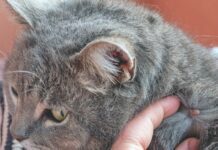According to a release from the University of Pennsylvania, scientists identified a domestic house cat, treated at Penn Vet’s Ryan Hospital, that was infected with the delta variant of SARS-CoV-2 through exposure from its owner. The full genome sequence of the virus was a close match to viral sequences circulating in people in the Philadelphia region at the time. The research was published in Viruses.
The find is the first published example of the delta variant occurring in a domestic cat in the United States. Notably, the cat’s infection was identified by testing its fecal matter. A nasal swab did not result in a positive test.
This particular pet cat, an 11-year-old female, was brought to Ryan Veterinary Hospital in September with gastrointestinal symptoms. It had been exposed to an owner who had COVID-19, alhough the owner had isolated from the cat for 11 days prior to its hospitalization.
While this case doesn’t raise alarms for the virus acquiring significant numbers of mutations as it moves between species, researchers hope to continue studying other examples to see how SARS-CoV-2 evolves. Penn Vet’s Institute for Infectious and Zoonotic Disease will facilitate this look at human-animal interactions when it comes to pathogen transmission. There is currently no evidence to suggest that cats can transmit SARS-CoV-2/COVID-19 to people.




